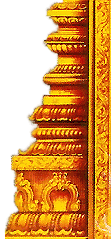|
|
Home >>
sivan >
sri Then Ganga Pureeswarar temple
|
| |
- Details
- Path
- Map
- Photos
- Near By Temple
| |
| Sri Then Ganga Pureeswarar temple |
|
| |
|
![[Image1]](http://img1.dinamalar.com/Kovilimages/T_500_2054.jpg)
|
| | |
| | | |
|
|
|
Moolavar | : |
Then Ganga Pureeswarar |
|
|
Urchavar | : |
| |
|
Amman / Thayar | : |
Brigan Nayaki, Masilambikai, Periya Nayaki | |
|
Thala Virutcham | : |
| |
|
Theertham | : |
| |
|
Agamam / Pooja | : |
- | |
|
Old year | : |
500-1000 years old | |
|
Historical Name | : |
- | |
|
City | : |
Thiru Vahindee Puram | |
|
District | : |
Cuddalore
| |
|
State | : |
Tamil Nadu |
| |
|
|
| |
|
|
 | Singers: |  |
| |
|
|
| |
- |
|
| |
|
|
 |
Festival: |
 |
| |
|
|
| |
- |
|
| |
|
|
 |
Temple's Speciality: |
 |
| |
|
|
| |
The rays of Moon fall on the feet of presiding Lord on each Poornima – full moon day. Lord Then Ganga Pureeswarar graces the devotees as Vaideeswarar and Marundheeswarar meaning that He acts as a physician offering medicines. This is the place where Lord and Mother Ambika took rest after destroying the three places – Muppuram and cooled themselves from the heat. The soft climate cooled them from scorching heat. |
|
| |
|
|
 |
Opening Time: |  |
| | | | | |
The temple is open from 7.00 a.m. to 9.00 a.m. and from 5.00 p.m. to 7.00 p.m. |
|
| | | |
 |
Address: |  |
| | | | | |
Sri BriganNayaki-Then Ganga Pureeswarar Temple, Chinna Nari Medu – 607 102 Edayar Kuppam, Panruti Taluk, Near Thiru Vahindi Puram, Cuddalore district. |
|
| | | |
 |
Phone: |  |
| | | |
| |
+91 98947 03148, 96009 20767 | |
|
| | |
 |
General Information: |  |
| |
|
|
| |
Lord appears from the sanctum sanctorum in sitting form with
one piece of cloth on Him. There is a
photograph of Sri Kannan Swamigal in the Artha Mandap. Though the temple was built in the 6th
or 7th century, a stone with inscriptions dates far back. This shows the renovation services under took
by Abimana Thunga Pallavarayar, a minister in the court of Maravarma Vikrama
Pandya VI. The temple should have been
great and famous in those days. The
river was long and broad. It is a pity
today that it is covered with bushes.
All the surroundings too are in a pitiable condition. The temple has just one shrine. A big phallus is lying upside down. A statue and a Vinayaka idol are under the
broken roof. During the invasions of
aliens, Aranthangi Nallur was floored.
All the houses and royal buildings were ruined. People migrated to other places. It has now become a residency for foxes and
wolves and the place came to be known as Narimedu meaning haven of foxes.
There are many evidences confirming the rise and fall of
this place. Probably, history also
confirms the Vedantha truth that rise and fall are natural. There are seven Nari Medus here.
Sages and Saints lived in other parts of the place
worshipping Lord Then Gangapureeswarar.
As they were ascetics, the place was called Sanyasipettai.
Chinna Narimedu: Lord Maha Ganapathy appears in a sitting form with His
Mooshika Vahan (belonging to the rat family) in a shrine. There is a Bali
peeta too. The Vimana (a tower above the
shrine) is small with Kalasa – a pot like design. The shrine is facing east. The phallus for Shivalinga is big but the
Bana too small. Presiding Lord and
Ambika – Brigan Nayaki, Masilambikai,Peria Nayaki are in their respective
shrines Lord Muruga from His own shrine
appears in a standing form. Lord
Dakshinamurthy graces from another shrine.
Peria Nari Medu.: There is a soapnut (Shikaikai) tree here, majestic in
stature welcoming the visitors. There
are shrines in this place for Mother Muthu Mari Amman, Vinayaka and
Muruga. There are also shrines for Lord
Kasi Viswanatha and Mother Visalakshi.
The population of Peria Narimedu is 600 and that of Chinna
Narimedu is 400 living in 80 houses. There is also a community of seventeen families of 90 people
called Valluva Pandarams depending on astrology for livelihood.
|
|
| |
|
|
 |
Prayers |  | |
|
| | | |
People pray here for cure from heat related diseases.
| | |
|
| |  |
Thanks giving: |  | |
|
| | | |
Devotees perform abishek and Archanas to Lord and Mother and offer Vastras. | | | |
| |  |
Greatness Of Temple: |  |
| |
|
|
| |
During Pallava rule, the highway between Tiru Pathiri
Puliyur and Tiruvadhigai ran close to the temple. Both the kings of Chola and Pandya dynasty
also maintained the temple in an admirable manner as is evident from epigraphic
information. After the temple lost its
glory and the constructions fell down, the people of the region took away the
idols, pillars etc. to various places, according to some evidence. There is also a plank with some carvings on
both sides, one side with a trident.
Details of epigraphy:
A piece of land at a place known as Ezhumedu at present was
registered during the rule of the Pandyas for the Shiva temple. The boundaries were marked as north of of the
Idai Nazhi limits, west of a canal and a street, south of Kedila river and also
west of farm lands around this temple.
It was vast in area. The taxes
collected from various traders were also earmarked for the temple maintenance
expenditure.
Abimana Thunga Pallavarayar was responsible for all these
achievements. A village named
Pallavaraya Natham also came into being on the eastern side of the temple at a
distance 1 km. More places renovated and
administered by this minister.
Tiruvadhigai, Tiruvandhipuram, Tirukandeswaram were among them.
The temple was noted for its fair administration by the
kings then and their executives and sweet melody sounds of Veda Mantras and the
smoke from Homas in those glorious days.
Despite decays, alien invasions and other political changes, the temple
still maintains its sanctity. The temple
stands majestically with its sanctum sanctorum with a Vimana.
|
|
| |
|
|
 |
Temple History: |  |
| |
|
|
| |
Saint Tirunavukkarasar had praised River Kedilam as Ganga of South in his Tiruvadhigai Veerattana hymns.
Mother Ganga is praised as Mandakini in heavens, Ganga on earth and Bogavathi in the world below. She individually grants the benefits of 3.5
crore theerthas mentioned in our scriptures.
She came to earth by the intense penance of Baghiratha, belonging to
Ikshvahu dynasty and with the blessings of Lord Shiva. Just seven drops only came to earth. Now this is the longest holy river in India. Lord Shiva controlled the furious velocity
fall of Ganga through His hair to save the
earth.
There are many stories about Ganga River. Ganga had to
incur the displeasure of Mother Parvathi for her love for Lord Shiva. Yet, she was relieved of the curse later.
The one story about Ganga is the creation of River Kedila by
Lord Shiva to quench the body heat He and Mother suffered w3hile destroying the
Tripuras responding to the prayers of sages.
The drops of Ganga in the hair of Lord
Shiva made Kedila still cooler. The
regions now called Ezhumedu-Narimedu was green enough with many herbal plants
curing heat related diseases in those days.
Learning about the medical values of the plants here, a king
then suffering from heat diseases came here to pluck them. He found a Shivalinga among the bushes,
worshipped, built a temple and also built a canal to bring water for temple and
public use. He also conducted the
consecration festival in a grand manner.
The king was cured of his heat related disease. River Kedila is praised as Ganga
of South.
|
|
| |
|
|
 |
Special Features: |  |
| |
|
|
| |
Miracle Based:
The rays of Moon fall on the feet of Lord on Poornima – full moon days. Lord in the temple graces His devotees as Vaidheeswarar and Maruntheeswarar.
|
|
| |
|
|
|
| |
|
|
|
|
| | Location :
Tiruvahindeepuram is 15 km far from Cuddalore, 7 km far from Panruti. The devotee has to alight in the Tiruvahindeepuram road, turn left at Palur and reach the temple in Chinna Narimedu. At the entrance of the main road there is a temple for Lord Muruga and Mother Kazhuthu Mari Amman.
Near By Railway Station :
Cuddalore
Near By Airport :
Chennai
Accomodation :
Cuddalore:
Hotel Suryapriya: +91-4142-233 178; 233 179
Hotel Vaigai: +91-4142-224 321
Hotel Woodlands: +91-4142 -230 717; 230 707
Hotel Durai: +91-4142-224 746; 224 646
Hotel Priya Inn: +91-98946 26157
Hotel Rajan: +91-+91-4142-235 403
| |
Warning: Undefined array key "G_T10" in /var/www/html/or-temple-st.dinamalar.com/public_html/en/new_en.php on line 594
Deprecated: explode(): Passing null to parameter #2 ($string) of type string is deprecated in /var/www/html/or-temple-st.dinamalar.com/public_html/en/new_en.php on line 594
Warning: Undefined array key "G_L10" in /var/www/html/or-temple-st.dinamalar.com/public_html/en/new_en.php on line 595
Deprecated: explode(): Passing null to parameter #2 ($string) of type string is deprecated in /var/www/html/or-temple-st.dinamalar.com/public_html/en/new_en.php on line 595
|
 |
|
|
|
|
|





